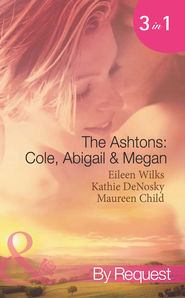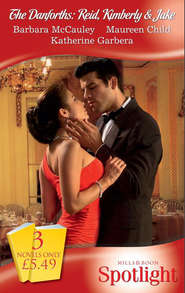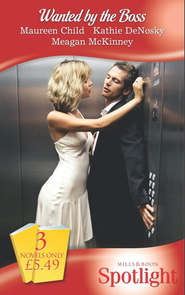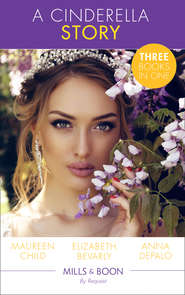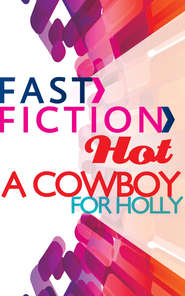По всем вопросам обращайтесь на: info@litportal.ru
(©) 2003-2025.
✖
Love - From His Point Of View!: Meeting at Midnight
Автор
Год написания книги
2019
Настройки чтения
Размер шрифта
Высота строк
Поля
That annoyed me. “You’re not a bitch at all.”
“I can be, when my temper’s up.”
“I have a temper, too, but no one calls me a bitch.”
She laughed. “I have a feeling no one calls you anything but ‘sir’ when you’re mad.”
“You haven’t been around my family.” I liked that I’d made her laugh. It was a good sound.
“You’re obviously close.” She tossed the washcloth in the sink. “Um…Gwen did say that you’d only known Zach for a few months. She said that was her fault.”
“It was my fault as much as hers.” I didn’t like talking about it…but I didn’t like her thinking I was the kind of bastard who’d ignore his son, either. “I didn’t know about Zach’s existence until last March. Gwen and I met when I was on vacation a few years ago. It didn’t work out—at least, I decided it wouldn’t work out. She has money, you see. Family money. A lot of it. I didn’t deal with that well when I found out. She, uh, threw away my address when I left, so by the time she realized she was pregnant, she didn’t know how to find me.”
“How did you learn about Zach, then?”
“She hired a detective. That was after she’d been diagnosed with breast cancer.” I added firmly, so she’d know the subject was closed, “She’s okay now. Anyway, she brought Zach here for a visit, and while Zach and I were getting acquainted, she and Duncan fell for each other.”
They’d fought it. In hindsight I could see that it must have been hell for both of them. They’d known I’d wanted to marry Gwen, and Duncan at least had accepted that I had a prior claim. But at the time I hadn’t been able to see anything except how betrayed I’d felt when I found out, how thoroughly my dreams had been destroyed.
Seely rested her hand on my knee. “I’m glad you told me. If Zach is going to be here often, I wouldn’t want to say or do the wrong thing.”
That was a good reason for having shot off my mouth. Not the real reason, maybe, but while we were on the subject…. “You should probably know something else. If Zach starts talking about the bad man and the policeman who shot him—well, that really happened. Maybe someone filled you in on that?”
They hadn’t. Useless bunch of busybodies. Why hadn’t they told her the stuff that mattered, so I wouldn’t have to? I didn’t like thinking about that night. The strobing red of the cop car lights, the hard white light inside the store, where a crazy bastard had held Gwen and my son at gunpoint…the fear, raw and jagged like a gutful of broken glass.
I’d failed them. No matter how often I told myself there was nothing I could have done to protect them, the bitterness of my failure didn’t go away.
But Seely would need to know the basics, so I told her about the holdup of a convenience store last April, and how Gwen and Zach had been among the hostages taken by a not-too-bright gunman. And how Duncan had saved them.
“My God, Ben. You said something about Zach having had a lot of uncertainty in his life, but I never imagined anything like this.”
“He seems to be doing okay. Gwen took him to this guy who does play therapy. That’s where kids tell their stories with toys,” I explained, “and the therapist sort of plays with them, only in a way that helps them work through things.”
“What about you?”
“I wasn’t part of it.”
“That’s what I mean. There’s nothing worse than being helpless when someone you love is hurting or in danger.”
Uncomfortable, I said, “I don’t usually blather on so much. I just thought you ought to know.”
She chuckled. “You call that blathering? I don’t think anything you said even qualifies as a secret. And I do know a few. It’s amazing what people will say to a paramedic. I suppose doctors and nurses experience that, too.”
Was that why I felt like there was something between us—because she’d saved my life? Turning the idea over in my mind, I decided it made sense.
She stood. “Seems to me you could use some play therapy yourself, but for now we’ll settle for getting you dressed. C’mon, up with you. I’ll take that sling off.”
The moment I stood, the room shrank. Seely was standing very close, and the soft herbal scent of her hair seemed stronger. I pretended I didn’t notice. “I can get this strap in front.”
“Okay. Turn a bit…there.” The sling came loose, and she slipped it off. “Of course, I don’t know half the secrets Daisy does. If you ever met her, you’d find yourself telling her your life story in no time. People do.”
My shoulder ached more without the sling’s support, so I supported that arm with my other hand. “Who’s Daisy? A friend?”
“That, yes. Also my mother.”
“You call your mother by her first name?”
“Sure. Can you get those buttons, or do you need some help?”
I thought about letting her unbutton my pajama shirt. Her knuckles would brush against my skin…better to let my right arm dangle and fumble the buttons out left-handed. “I can do it. You did say your mother was unusual.”
She chuckled again. A man could get hooked on that sound. “Unusual, yes. She used to be a flower child. The real thing, Haight-Ashbury and all that. In some ways she still is, though she’s doing pretty well as an artist these days. I tease her that she’s lost in the sixties. Here, we’ll do the difficult arm first.”
She eased the pajama shirt off my shoulder. It fit snugly over the bandages, so she had to take her time. It was ridiculous to get turned on by that, under the circumstances. But it was a good thing the sweatpants were baggy. “An artist, huh? What kind?”
“Sculpture. She’s into what she calls found art these days. Some people call it junk—” her grin flashed “—but she’s had two showings at a prestigious gallery in Taos. She scavenges for things people throw away, then paints this or that, puts the objects together and ends up with some pretty interesting pieces.”
“Real modern stuff, I take it.”
“Well, one critic called it ‘an entrancing collision between the primitive and the twenty-first century,’ but yes. I have a sneaking suspicion it wouldn’t be your type of art.” She tossed the pajama shirt on the back of the toilet, then picked up the flannel shirt she’d brought down earlier.
“What about your father? What does he do?”
“Who knows? He came down with a bad case of respectability a few years after I was born. Poor man. I don’t think he ever recovered. Here, hold out your arm.”
She didn’t say anything else while I eased my right arm slowly into a sleeve, then my left. This gave me plenty of time to kick myself. She’d mentioned her mother several times, her father not at all. That should have clued me in.
“I know your shoulder is hurting,” she said cheerily. “Turn around and let me do up the buttons. That way you can support that arm until we get the sling back on.”
I did turn, but ignored the rest of her instructions. “Sometimes I don’t watch where I’m putting my big feet. I stepped in the wrong place. I’m sorry.”
Her eyes flicked to mine, surprised. Then a wry smile tipped her lips. “Ben, you’re supposed to pretend there’s nothing beneath my flip attitude but more flip.”
“I’m not much good at pretending.”
“No, you aren’t,” she said so gently she seemed to be touching on some great secret. “I think I like that about you.”
She liked my voice, too. And I liked all sorts of things about her. My gaze drifted to her mouth. “I can’t imagine what it would be like to grow up with so little family. I’m used to a crowd.”
“But you were a lot older than the others, weren’t you? You said Duncan is the closest to you in age, and he’s five years younger. That’s not a big difference now, but it would have been when you were growing up. You wouldn’t have played together, or gone on double dates when you were teens, or—oh, all the things an only child thinks siblings are for.”
“No, but that’s not…they mattered. I mean, it mattered that they were around, that…hell. I don’t know how to say it.”
“Maybe that they were a huge part of your life? And you love them.”
I nodded, relieved that she understood. “I’m not great with words.”
“I think you do pretty well.” She paused, then went on quietly, “I haven’t seen or spoken to my father since I was eight. Um…he and Daisy weren’t married.”
Другие электронные книги автора Maureen Child
Vanished




 0
0






